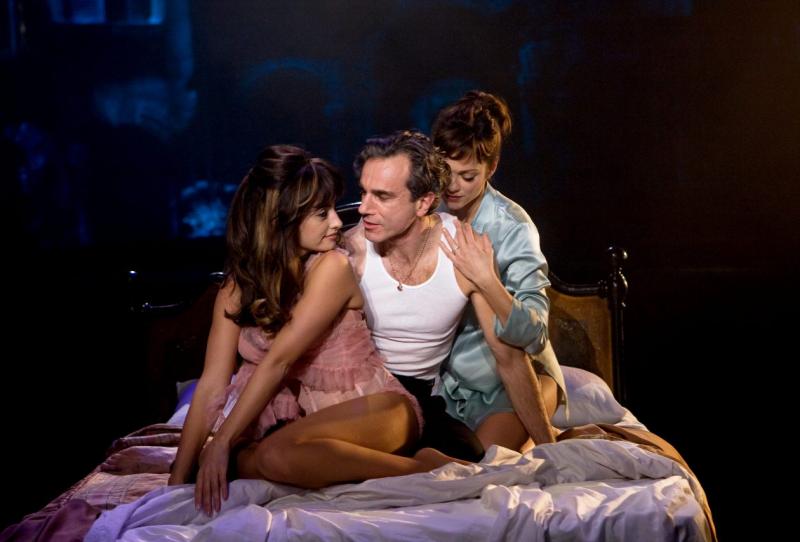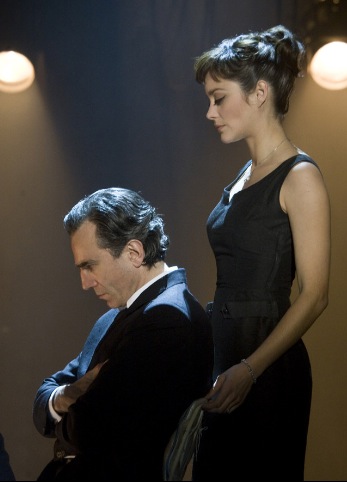Nine | reviews, news & interviews
Nine
Nine
The latest transfer from stage to screen is stuffed with Oscar-winners

A funny thing happened to the movie musical of late: a genre thought to be moribund learned once again to sing, even if - as so often happens in education - there have been some truants along the way. In recent years, we've had Chicago and Hairspray, The Producers and Sweeney Todd, all of them adapted from Broadway shows familiar to UK playgoers as well. Now, along comes the riskiest of them all, Rob Marshall's Nine.
The divided opinions have already made themselves known, and how, with Variety proffering a rave even as The Hollywood Reporter sniffed. At the gala Leicester Square premiere, theatre buffs eager to see which numbers from Tony-winner Maury Yeston's ravishing score had made the final cut sat among others clearly dazed and confused by the movie before them, not least one avid spectator who prowled the circle during the film so she could get a closer look at stars Nicole Kidman and Penélope Cruz seated in the front row.
What those in attendance purely to celebrity-spot made of the material itself is anyone's guess. The fact is, whereas Marshall's previous movie musical foray, Chicago, sold the sizzle big-time in 2002, sweeping that year's Oscars, Nine deploys glamour and glitz aplenty only to illuminate a place that is contrastingly dark: a filmmaker, Guido Contini, in the throes of a protracted nervous breakdown that all the most glorious women imaginable can't put right; indeed, they would seem to some considerable degree to be the cause.
Adapted itself from a film, Fellini's 8½, Nine in its first Broadway incarnation in 1982 was an exercise in style, a showpiece for the director-choreographer Tommy Tune, who draped his mostly female cast around the late Raul Julia (the musical's leading man) on an austerely elegant tiled set that had Forbidden Chic written all over it.
So far so soulless, which seemed strange given a score from one-time Yale professor Yeston that remains one of the Broadway theatre's most lustrous in its mixture of the hymnal and the raunchy, anthemic paeans to sexual possibility ("Be Italian") featured alongside numbers alternately torrid ("Be On Your Own", sung by Guido's aggrieved wife) and haunting ("Unusual Way", the wistful signature song of Guido's actress/muse, Claudia, a number since covered by Barbra Streisand, among many others).
Since then, Nine has been performed in various contexts, ranging from a Festival Hall concert with Jonathan Pryce and Elaine Paige to a fully staged London premiere at the Donmar (Larry Lamb played Guido) and a scintillating 2003 Broadway revival from David Leveaux in which Antonio Banderas gave existential despair a singularly elfin appeal. More purely red-blooded spectators at that same production no doubt only had eyes for Tony winner Jane Krakowski, as Guido's mistress, Carla, whose first-act writhings suddenly made an airborne sheet look the sexiest place one could ever think to be.
And now to Rob Marshall, the former Broadway choreographer who in fact has become far more prominent a film presence than he was even in the New York theatre. And you know what? By taking a show that has at its source an iconic European movie and bringing the stage musical as it were back home, Marshall both honours the celluloid origins of Nine - the "Be Italian" sequence on the beach in Pesaro becomes a cunning homage to that country's cinematic neo-realism - and preserves much of Yeston's score. I say "much of" because just as Chicago on screen jettisoned the second-act duet ("Class") so beloved on stage, Nine loses chunks of music across both acts: Guido's ticklish "Only With You" was in fact filmed, and I gather may make it onto the DVD, which will please those of us delighted to know how well Daniel Day-Lewis carries a tune and are keen to hear more of him doing precisely that.
Day-Lewis, in fact, is the casting masterstroke of a richly (if, in terms of nationality, eclectically) populated movie that includes a British dame (Judi Dench, in prime form) playing a former Folies Bergère habituée who is now a costume designer based in Rome (!) and an Australian Oscar-winner (Nicole Kidman) as an Italian movie goddess with a Swedish last name, Jenssen: think Claudia Cardinale meets Anita Ekberg.
 Fellow Oscar-winner Cruz, playing the Krakowski role of the (near-suicidal, in this version) mistress, benefits from a meatier take on the part than exists in the stage show, while the very best of the women is yet another Oscar-bearer, Marion Cotillard (pictured right with Daniel Day-Lewis), whose fierce take on the wife, Luisa, anchors an essentially plotless narrative that could merely devolve into a series of turns. (I was less enamoured of Kate Hudson, who gets a rather mechanically conceived new number, "Cinema Italiano", that already threatens to be the stuff of an Oscar ceremony's kitschy nightmares.)
Fellow Oscar-winner Cruz, playing the Krakowski role of the (near-suicidal, in this version) mistress, benefits from a meatier take on the part than exists in the stage show, while the very best of the women is yet another Oscar-bearer, Marion Cotillard (pictured right with Daniel Day-Lewis), whose fierce take on the wife, Luisa, anchors an essentially plotless narrative that could merely devolve into a series of turns. (I was less enamoured of Kate Hudson, who gets a rather mechanically conceived new number, "Cinema Italiano", that already threatens to be the stuff of an Oscar ceremony's kitschy nightmares.)
None of the distaff contributions - Sophia Loren as Guido's spectral mamma included - would mean much without Day-Lewis as the charismatic filmmaker in crisis, a role that allows an ever-intense performer to command attention even when holding his head in his hands, which would seem to be Guido's default position throughout the film. And at the end, as the women reappear for one last time draped on and around a balcony as if ready to take their bows, Day-Lewis gives us an artist who has bottomed out and come out the other side, a journey some will remember this extravagantly gifted actor having undergone in his own creative life.
What, then, of Nine in comparison to other movie musicals of late? Well, it's both better sung and far wittier than Tim Burton's strangely unsatisfying Sweeney Todd, which suffered from the least funny Mrs Lovett (Helena Bonham Carter) in my experience, and it upends its theatrical roots in a way that the slavish screen transcription of The Producers from novice filmmaker Susan Stroman never managed once. Mamma Mia!? Fun if crude, not that many people seemed to mind. It must be said that I'm not sure how Nine will fare, given that it charts what is at core an interior journey where Chicago trafficked in murder and showbiz and sex. But anyone who's ever looked at a frustratingly blank page, or met with a lover's blank (or worse) stare, will surely warm to Guido's reckoning. And if not? In that case, just sit back and let the ladies do their thing.
Watch the trailer to Nine
The future of Arts Journalism
You can stop theartsdesk.com closing!
We urgently need financing to survive. Our fundraising drive has thus far raised £49,000 but we need to reach £100,000 or we will be forced to close. Please contribute here: https://gofund.me/c3f6033d
And if you can forward this information to anyone who might assist, we’d be grateful.

Subscribe to theartsdesk.com
Thank you for continuing to read our work on theartsdesk.com. For unlimited access to every article in its entirety, including our archive of more than 15,000 pieces, we're asking for £5 per month or £40 per year. We feel it's a very good deal, and hope you do too.
To take a subscription now simply click here.
And if you're looking for that extra gift for a friend or family member, why not treat them to a theartsdesk.com gift subscription?
more Film
 Blu-ray: Wendy and Lucy
Down-and-out in rural Oregon: Kelly Reichardt's third feature packs a huge punch
Blu-ray: Wendy and Lucy
Down-and-out in rural Oregon: Kelly Reichardt's third feature packs a huge punch
 The Mastermind review - another slim but nourishing slice of Americana from Kelly Reichardt
Josh O'Connor is perfect casting as a cocky middle-class American adrift in the 1970s
The Mastermind review - another slim but nourishing slice of Americana from Kelly Reichardt
Josh O'Connor is perfect casting as a cocky middle-class American adrift in the 1970s
 Springsteen: Deliver Me From Nowhere review - the story of the Boss who isn't boss of his own head
A brooding trip on the Bruce Springsteen highway of hard knocks
Springsteen: Deliver Me From Nowhere review - the story of the Boss who isn't boss of his own head
A brooding trip on the Bruce Springsteen highway of hard knocks
 The Perfect Neighbor, Netflix review - Florida found-footage documentary is a harrowing watch
Sundance winner chronicles a death that should have been prevented
The Perfect Neighbor, Netflix review - Florida found-footage documentary is a harrowing watch
Sundance winner chronicles a death that should have been prevented
 Blu-ray: Le Quai des Brumes
Love twinkles in the gloom of Marcel Carné’s fogbound French poetic realist classic
Blu-ray: Le Quai des Brumes
Love twinkles in the gloom of Marcel Carné’s fogbound French poetic realist classic
 Frankenstein review - the Prometheus of the charnel house
Guillermo del Toro is fitfully inspired, but often lost in long-held ambitions
Frankenstein review - the Prometheus of the charnel house
Guillermo del Toro is fitfully inspired, but often lost in long-held ambitions
 London Film Festival 2025 - a Korean masterclass in black comedy and a Camus classic effectively realised
New films from Park Chan-wook, Gianfranco Rosi, François Ozon, Ildikó Enyedi and more
London Film Festival 2025 - a Korean masterclass in black comedy and a Camus classic effectively realised
New films from Park Chan-wook, Gianfranco Rosi, François Ozon, Ildikó Enyedi and more
 After the Hunt review - muddled #MeToo provocation
Julia Roberts excels despite misfiring drama
After the Hunt review - muddled #MeToo provocation
Julia Roberts excels despite misfiring drama
 London Film Festival 2025 - Bradley Cooper channels John Bishop, the Boss goes to Nebraska, and a French pandemic
... not to mention Kristen Stewart's directing debut and a punchy prison drama
London Film Festival 2025 - Bradley Cooper channels John Bishop, the Boss goes to Nebraska, and a French pandemic
... not to mention Kristen Stewart's directing debut and a punchy prison drama
 Ballad of a Small Player review - Colin Farrell's all in as a gambler down on his luck
Conclave director Edward Berger swaps the Vatican for Asia's sin city
Ballad of a Small Player review - Colin Farrell's all in as a gambler down on his luck
Conclave director Edward Berger swaps the Vatican for Asia's sin city
 London Film Festival 2025 - from paranoia in Brazil and Iran, to light relief in New York and Tuscany
'Jay Kelly' disappoints, 'It Was Just an Accident' doesn't
London Film Festival 2025 - from paranoia in Brazil and Iran, to light relief in New York and Tuscany
'Jay Kelly' disappoints, 'It Was Just an Accident' doesn't
 Iron Ladies review - working-class heroines of the Miners' Strike
Documentary salutes the staunch women who fought Thatcher's pit closures
Iron Ladies review - working-class heroines of the Miners' Strike
Documentary salutes the staunch women who fought Thatcher's pit closures

Add comment